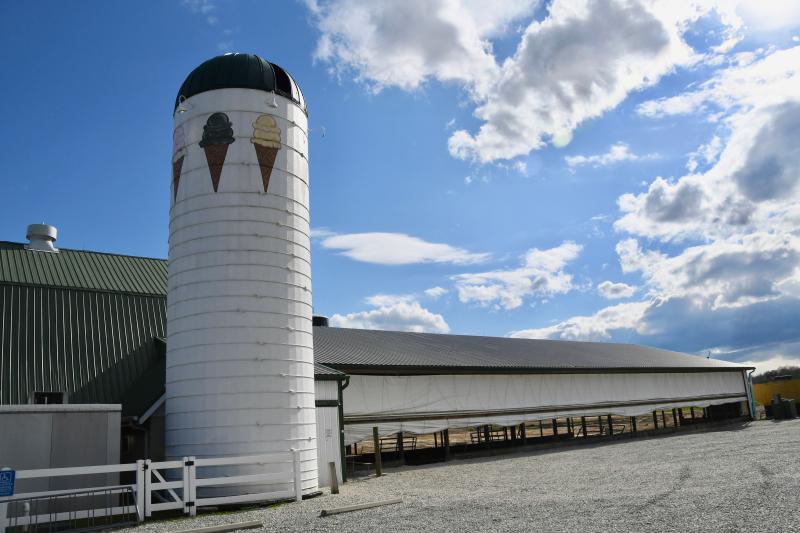Hopkins Farm: No more moos, but plenty of news
The last of the remaining 400 Hopkins Farm cows were sold and left the farm Feb. 4.
That brought to an end more than 80 years of cows and a dairy farm operation on the family farm west of Lewes.
Now, owners Ingrid and Amy Hopkins are formulating a plan to repurpose the 1,000-acre farm. First and foremost, they want it known that no land will be sold for development. In fact, two-thirds of the farm is in the state's farmland preservation program.
Although no specific plans are being announced, the sisters say they have many ideas to explore as they institute a phased project over the next two to three years.
Phase 1 of their project includes demolition of 10 old buildings to make way for future growth. Remaining are the iconic barn, silo and surrounding outbuildings at Hopkins Farm Creamery on Dairy Farm Road. The ice cream shop started operations in 2008 and has become a favorite for locals and tourists.
They are in the process of converting a cow and calf barn into an indoor pavilion, and are building new restrooms and adding more parking space for the ice cream shop.
As fences and buildings are removed, more land will be devoted to growing corn, soybeans and wheat with the grains ending up in poultry feed to support the region's poultry industry.
“Like many of the small businesses in this community, the environment has made it very challenging for the family to continue to provide the same level of care and service to the community,” Ingrid said. “That, combined with the aging equipment and infrastructure of Hopkins Farm running continuously for more than 100 years, presented us with an opportunity to reimagine the future of the Hopkins Farm experience.”
“With the guidance and support of our father, Walter Hopkins, and his lifetime knowledge of the farm, family and community, we are reimagining the future with a multi-phased plan that will transform the old farm into a new farm destination for locals and visitors alike with a focus on family and education,” Amy said.
Over the past few years, a section of the farm, including the family farmhouse, has been transformed into Hopkins Heartland and Covered Bridge Inn, a farm-based, award-winning wedding and special-events venue.
Because all of the venues are on preserved farmland, the buildings have had to be restored and not torn down. The family's original farmhouse – dating back to 1837 – is now the Covered Bridge Inn, and the original dairy, milking and grain barns have been repurposed as part of the Hopkins Heartland venue.
The sisters said, for now, ice cream, crops and weddings will support the farm operation.
About reimagining
The key word the sisters use is reimagining. “Imagine a place that offers an experience for an entire day. Imagine visiting for a picnic and sitting by a pond, walking through trails in open spaces next to farm animals where you can see and learn about farm life. Imagine not just enjoying ice cream, but come for breakfast, lunch or dinner under the stars next to a fire pit. It won't be just be farm to table, it will be a family experience,” the sisters said.
“Imagine a place where you can buy local Sussex County produce, pick your own pumpkins or maybe take a run through a corn maze. We are reimagining the farm experience while simultaneously staying true to five generations of Hopkins Farm, and the values and traditions of our local farming neighbors and the community that has supported us,” they said.
The Hopkinses have operated a farm for more than 100 years and a dairy farm for more than 80 years, with its milking parlor working nonstop every day of the year. The family never missed the three-times-a-day milking schedule or its daily milk shipment in spite of some horrible weather conditions over the years. The Hopkins’ Henlopen Holsteins were producing 6,000 gallons of milk daily as part of a contract with Land O' Lakes, which the family did not renew.
Most of the cows were sold to a large dairy farm near Watertown in upstate New York, near Lake Ontario, while some ended up on farms in Pennsylvania and Maryland.
Not lost to the sisters are the memories created during the annual farm field trips experienced by many thousands of schoolchildren, teachers and parents over the decades. “We want to bring that experience back. As stewards of the land, it's our responsibility to continue education about farming,” Amy said.
“The possibilities are endless,” said Ingrid. “And we want to do it right.”
























































